
Wayang, also known as wajang, is a traditional form of puppet theatre play originating from the Indonesian island of Java. Wayang refers to the entire dramatic show. Sometimes the leather puppet itself is referred to as wayang. Performances of wayang puppet theatre are accompanied by a gamelan orchestra in Java, and by gender wayang in Bali. The dramatic stories depict mythologies, such as episodes from the Hindu epics the Ramayana and the Mahabharata, as well as local adaptations of cultural legends. Traditionally, a wayang is played out in a ritualized midnight-to-dawn show by a dalang, an artist and spiritual leader; people watch the show from both sides of the screen.

The Sultanate of Mataram was the last major independent Javanese kingdom on the island of Java before it was colonised by the Dutch. It was the dominant political force radiating from the interior of Central Java from the late 16th century until the beginning of the 18th century.

LazyTown is an English-language Icelandic children's television series created by aerobics champion Magnús Scheving. The show was designed to encourage healthy lifestyles. The series was based on Scheving's stage plays Áfram Latibær! and Glanni Glæpur í Latabæ. Every episode was filmed in Garðabær.

Topeng is a dramatic form of Indonesian dance in which one or more mask-wearing, ornately costumed performers interpret traditional narratives concerning fabled kings, heroes and myths, accompanied by gamelan or other traditional music instruments. Topeng dance is a typical Indonesian dance that can be found in various regions in Indonesia. Topeng dance has the main characteristic that the dancers use masks to cover their faces. The dance will usually be performed by one dancer or a group of dancers.
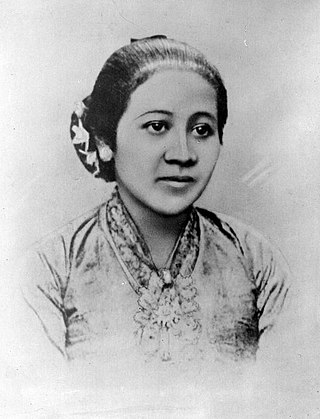
Raden Adjeng Kartini, also known as Raden Ayu Kartini, was a prominent Indonesian activist who advocated for women's rights and female education.

RCTI is a West Jakarta-based Indonesian free-to-air television network. It is best known for its soap operas, celebrity bulletins, news, and sports programmes. It was first launched in 1989, originally as a local pay television operator that broadcasts mostly foreign programmes, before switching to free-to-air terrestrial network a year later.
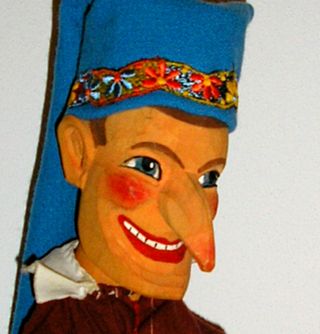
Kasperle, Kasper, or Kasperl is a famous and traditional puppet character from Austria, German-speaking Switzerland, and Germany. Its roots date to 17th century, and it was at times so popular that Kasperltheater was synonymous with puppet theater. Kasperltheater includes the following characters: Kasper, Gretel, Seppel, Grandmother, princess, king, witch, robber, and crocodile. The older, more traditional Kasperle shows are very similar to "Mister Punch". There are also "Kasperle versions" of the Grimm and other fairy tales and of "modern fairy tales".

Wayang wong, also known as wayang orang, is a type of classical Javanese and Balinese dance theatrical performance with themes taken from episodes of the Ramayāna or Mahabharāta. Performances are stylised, reflecting Javanese court culture:
Wayang wong dance drama in the central Javanese Kraton of Yogyakarta represents the epitome of Javanese aesthetic unity. It is total theatre involving dance, drama, music, visual arts, language, and literature. A highly cultured sense of formality permeates every aspect of its presentation.

Stephanie is a fictional character from the Icelandic children's television show LazyTown. She is an aspiring cheerleader and dancer who inspires the other citizens of the titular town to stay active. She has pink hair and as such is nicknamed 'Pinky' by the puppet character Trixie. She came to town to visit her uncle, Milford Meanswell, the mayor of LazyTown. Upon meeting the other children, she unsuccessfully attempted to get them to play along as opposed to staying at home playing video games and eating candy. This changed when Stephanie asked for the help of Sportacus. When he finally arrived, the whole town worked together to make LazyTown a more active place to live. Each episode of the show ends with Stephanie performing a song and dance routine to "Bing Bang", the show's ending theme.
Sunan Kalijaga was one of the "nine saints" of Javanese Islam. The "Kalijaga" title was derived from an orchard known as "Kalijaga" in Cirebon. Other accounts suggest the name derives from his hobby of submerging himself in Kali. Others note that the name Kalijaga derived its nature from the Arabic notion of qadli dzaqa which means "holy leader" in the sultanate.

Sunan Giri, Muhammad Ainul Yakin (born 1442 CE in Blambangan is considered one of the Wali Sanga of Indonesia.

Poerbatjaraka was a Javanese/Indonesian self-taught philologist and professor, specialising in Javanese literature. The eldest son of a Surakarta royal courtier in the Dutch East Indies, he showed interest in Javanese literature at an early age, reading from books in the court's collection. Despite attending only primary school, his knowledge of Dutch and Javanese literature allowed him to take a position at the colony's Archaeology Service, and then at Leiden University in the Netherlands. He was allowed to obtain a doctor's degree at Leiden. He then returned to the colony to work at a Batavia museum, cataloguing Javanese texts and writing scholarly works. After Indonesia's independence, he became a professor at the universities of Indonesia, Gajah Mada, and Udayana.
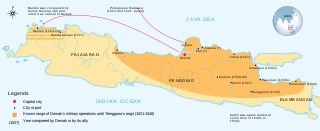
The Demak Sultanate was a Javanese Muslim state located on Java's north coast in Indonesia, at the site of the present-day city of Demak. A port fief to the Hindu-Buddhist Majapahit kingdom thought to have been founded in the last quarter of the 15th century, it was influenced by Islam brought by Muslim traders from China, Gujarat, Arabia and also Islamic kingdoms in the region, such as Samudra Pasai, Malacca and Bani (Muslim) Champa. The sultanate was the first Muslim state in Java, and once dominated most of the northern coast of Java and southern Sumatra.

The Panji tales are a cycle of Javanese stories, centred around the legendary prince of the same name from East Java, Indonesia. Along with the Ramayana and Mahabharata, the tales are the basis of various poems and a genre of wayang known in East Java as wayang gedhog. Panji tales have been the inspiration of Indonesian traditional dances, most notably the topeng (mask) dances of Cirebon and Malang, as well as gambuh dance-drama in Bali. Especially in the environs of Kediri, the suggested homeland of the tales of Panji, local stories grew and were connected with the obscure legendary figure of Totok Kerot. Panji tales have spread from East Java (Indonesia) to be a fertile source for literature and drama throughout Indochina Peninsula and Malay World as well.

Keong Emas is a popular Javanese folklore about a princess magically transformed and contained in a golden snail shell. The folklore is a part of popular Javanese Panji cycle telling the stories about the prince Panji Asmoro Bangun and his consort, princess Dewi Sekartaji.
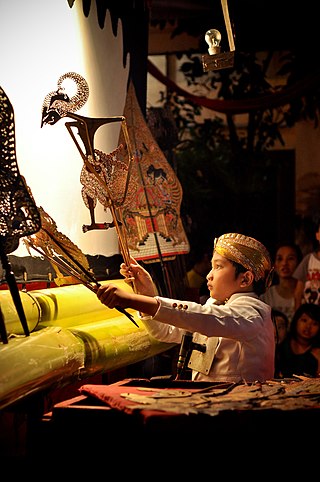
Wayang kulit is a traditional form of puppet-shadow play originally found in the cultures of Java and Bali in Indonesia. In a wayang kulit performance, the puppet figures are rear-projected on a taut linen screen with a coconut-oil light. The dalang manipulates carved leather figures between the lamp and the screen to bring the shadows to life. The narratives of wayang kulit often have to do with the major theme of good vs. evil.
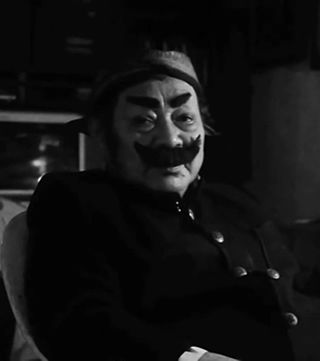
Drs. Suyadi, also known as Pak Raden, was an Indonesian animator, puppeteer and television presenter, creator of the children's television series Si Unyil. Suyadi created Si Unyil as an educational program for Indonesian children in the 1980s. In the 2000s, Unyil was updated with a new series, Laptop Si Unyil.
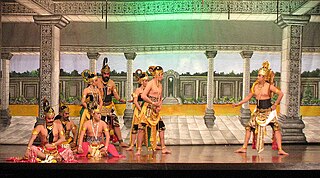
Indonesian theatre is a type of art in the form of drama performances that are staged on a stage, with a distinct Indonesian nuance or background. In general, theatre is an art that emphasizes the performing arts that are displayed in front of a large crowd. In other words, theater is a form of visualisation of a drama that is staged on the stage and watched by the audience. Indonesian theatre includes the performing arts of traditional theater and modern theatre located in the territory of Indonesia. Some examples of Indonesian theater are Arja, Wayang, Wayang wong, Lenong, Ludruk, Janger, Randai and others. Theatre in Indonesia can also be referred to as regional or ethnic theatre, because it originates and develops from 1,300 ethnic cultures in Indonesia.

TVRI is the main national public television channel owned by LPP Televisi Republik Indonesia (TVRI). The channel began broadcasting on 24 August 1962, making it the first television station in Indonesia. The channel was also the only television channel choice in Indonesia until 1989, when Programa Dua TVRI in Jakarta broadcast separately from TVRI and private television stations began broadcasting.

Abdul Hamid, or more popularly known by the name of his puppet character Pak Ogah, was an Indonesian voice actor and puppeteer. He is best known for his portrayal of the lazy unemployed character Pak Ogah in Si Unyil. His character became popular and became an icon among Indonesian children, along with other characters from the show. He died on 28 December 2022, after suffering from several complications from a stroke.



















